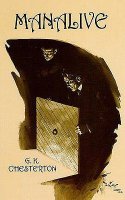 Manalive, by G. K. Chesterton (Dover, 2000, originally published in 1912 by the John Lane Company)
Manalive, by G. K. Chesterton (Dover, 2000, originally published in 1912 by the John Lane Company)
Orion is upside down.
My first view of the Southern Hemisphere sky; floating above a seemingly infinite abyss while snorkeling through crystal-clear water; reading C.K. Chesterton’s Manalive. Awestruck, weak-kneed, disoriented, and just on the edge of fear. How can I review a book that reviews me?
Reading Chesterton can be a lot like trying to drink from a waterfall. I know I’m in the presence of a mind and a spirit much greater than my own. There’s wordplay and swordplay; there are twists in the logic and logic in the twists. It’s like riding a well-designed roller coaster, or skiing down a slope that’s just beyond your skill level.
I hear you muttering through your clenched teeth: “Get on with it! What is the book about?” In a phrase: the joy of being alive.
Okay, okay. From the back cover:
Innocent Smith … is taken up by a fierce wind one day and dropped on the lawn of a boardinghouse inhabited by a group of disillusioned young people. … In the course of the book, Smith courts and remarries his wife repeatedly, lives in various houses, which all turn out to be his own, and attempts murder, but only succeeds in firing life into his victims. … Manalive is full of high-spirited nonsense expressing important ideas: life is worth living, one can break with convention and still maintain moral and ethical standards, and much of the behavior that civilized man has been led to believe is wrong, isn’t wrong at all.
That’s about as good a summary as you’re going to get, though it is rather like trying to learn what a roller coaster is by consulting Merriam-Webster: an elevated railway … constructed with sharp curves and steep inclines on which cars roll.
You have to brave the ride.


